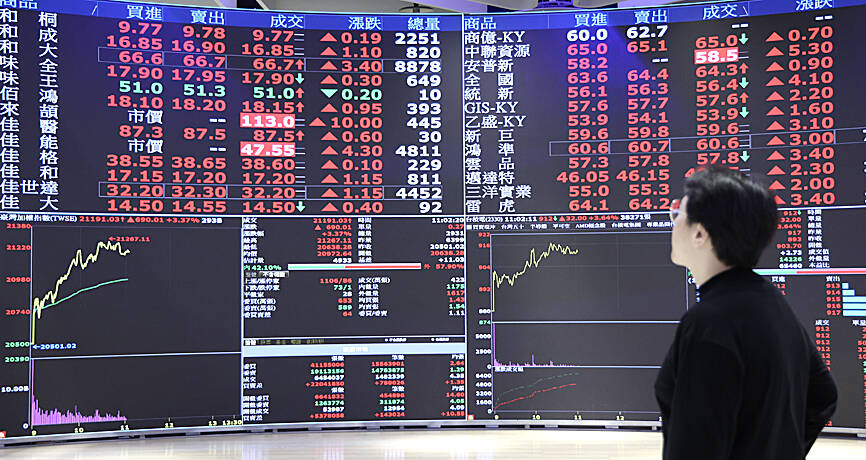Global index provider MSCI Inc yesterday announced that it would trim Taiwan’s weighting in two of its major indices and leave it unchanged in another in keeping with a quarterly index review.
The company said it would leave Taiwan’s weighting intact in the MSCI All Country World Index at 1.98 percent, while cutting Taiwan’s weighting in the MSCI Emerging Markets Index by 0.32 percentage points to 19.1 percent and drop its weighting in the MSCI All-Country Asia ex-Japan Index by 0.18 percentage points to 21.94 percent.
The adjustments would take place at the end of the trading session on Aug. 30 and would inflate the day’s turnover.

Photo: CNA
Stocks are added or removed from an index by analysts within MSCI to ensure that the index still acts as an effective equity benchmark for the market it represents.
The investment company reviews its indices on a quarterly basis in February, May, August and November each year.
MSCI said it would increase the weighting of Taiwan Semiconductor Manufacturing Co (TSMC, 台積電) by 0.2 percentage points to 51.22 percent, as it expects the world’s largest maker of advanced chips would emerge as a major beneficiary of an artificial intelligence boom.
MSCI said it would remove Formosa Petrochemical Corp (台塑石化) from the Taiwanese components.
Analysts said the removal reflected a decline in the share price of Formosa Petrochemical, which was down by almost 21 percent since the beginning of this year as of Monday.
MSCI would add 14 Taiwanese stocks to its MSCI Global Small Cap Indexes, including electronics component maker Chenming Electronic Tech Corp (晟銘電子), IC packaging and testing services provider Elite Advanced Laser Corp (聯鈞光電) and diode product supplier Eris Technology Corp (德微科技), it said.
Among the other Taiwanese stocks to be added are automotive electronics provider G-Shank Enterprise Co (鉅祥企業), Huang Hsiang Construction Corp (皇翔建設), electronic components maker Jess-Link Products Co (佳必琪國際) and building materials supplier Wang Chang General Contractor Co (皇昌營造), it added.
It is to remove convenience store chain operator Taiwan FamilyMart Co (全家便利商店) from the MSCI Global Small Cap Indexes, it said.
The adjustments were scheduled to go into effect after markets close on Aug. 30, it added.
Passive funds linked to the indices totaled US$15 trillion, making their adjustments closely monitored.
Shares in all the 14 stocks that are to join the MSCI small-cap basket picked up yesterday, although the TAIEX shed points for most of the session, but staged a last-minute 0.11-percent rally to 21,796.57, Taiwan Stock Exchange data showed.
Daily turnover tapered to a lackluster NT$342.750 billion (US$10.56 billion).

On Tuesday, US President Donald Trump weighed in on a pressing national issue: The rebranding of a restaurant chain. Last week, Cracker Barrel, a Tennessee company whose nationwide locations lean heavily on a cozy, old-timey aesthetic — “rocking chairs on the porch, a warm fire in the hearth, peg games on the table” — announced it was updating its logo. Uncle Herschel, the man who once appeared next to the letters with a barrel, was gone. It sparked ire on the right, with Donald Trump Jr leading a charge against the rebranding: “WTF is wrong with Cracker Barrel?!” Later, Trump Sr weighed

HEADWINDS: Upfront investment is unavoidable in the merger, but cost savings would materialize over time, TS Financial Holding Co president Welch Lin said TS Financial Holding Co (台新新光金控) said it would take about two years before the benefits of its merger with Shin Kong Financial Holding Co (新光金控) become evident, as the group prioritizes the consolidation of its major subsidiaries. “The group’s priority is to complete the consolidation of different subsidiaries,” Welch Lin (林維俊), president of the nation’s fourth-largest financial conglomerate by assets, told reporters during its first earnings briefing since the merger took effect on July 24. The asset management units are scheduled to merge in November, followed by life insurance in January next year and securities operations in April, Lin said. Banking integration,

LOOPHOLES: The move is to end a break that was aiding foreign producers without any similar benefit for US manufacturers, the US Department of Commerce said US President Donald Trump’s administration would make it harder for Samsung Electronics Co and SK Hynix Inc to ship critical equipment to their chipmaking operations in China, dealing a potential blow to the companies’ production in the world’s largest semiconductor market. The US Department of Commerce in a notice published on Friday said that it was revoking waivers for Samsung and SK Hynix to use US technologies in their Chinese operations. The companies had been operating in China under regulations that allow them to import chipmaking equipment without applying for a new license each time. The move would revise what is known

Artificial intelligence (AI) chip designer Cambricon Technologies Corp (寒武紀科技) plunged almost 9 percent after warning investors about a doubling in its share price over just a month, a record gain that helped fuel a US$1 trillion Chinese market rally. Cambricon triggered the selloff with a Thursday filing in which it dispelled talk about nonexistent products in the pipeline, reminded investors it labors under US sanctions, and stressed the difficulties of ascending the technology ladder. The Shanghai-listed company’s stock dived by the most since April in early yesterday trading, while the market stood largely unchanged. The litany of warnings underscores growing scrutiny of